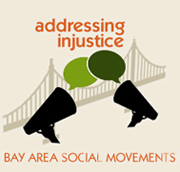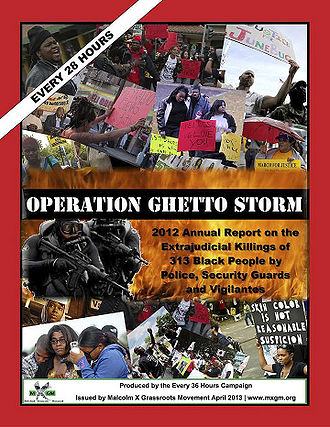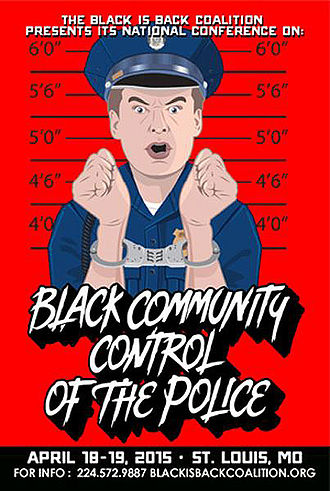Black Nationalism in Oakland: Responding to Police Brutality
Historical Essay
by Sybil Lewis, 2015, Part 3 of 3
Police Brutality and Self-Defense
Members of the The Malcolm X Grassroots Movement (MXGM) and the African People’s Socialist Party (APSP) dedicate a lot of time educating people about their ideals and histories not only to have an empowered understanding of self, but also to harness support for different projects and protests. Both organizations focus heavily on ending and responding to police brutality in Black communities, which is referred to by both groups as police terrorism to highlight that they view the police as the “state organ of coercion” that is occupying Black communities.
The Black Panther Party (BPP) focused heavily on ending what they say as an oppressive police force in Black communities in North Richmond and Oakland by following a strategy of ‘policing the police,’ wherein Huey Newton and Bobby Seale would arm themselves and follow the police to patrol their actions. The seventh demand of the BPP’s Ten Point Plan is an
immediate end to police brutality and murder of Black people, which the party believed could be achieved by “organizing Black self-defense groups that are dedicated to defending our Black community from racist police oppression and brutality.”(1) Many Black nationalist groups focus on defending themselves from the police because it is the most visible way to fight state power and as Huey Newton theorized, the lumpenproletariat do not have resources to join a union as the working class do and lack political acumen to fight legislation; therefore, the poorest Black people have “no immediate oppressor expect perhaps the Pig Police with which [they] are confronted daily.”(2)
Operation Ghetto Storm: 2012 Annual Report on the Extrajudicial Killing of 313 Black People
Image: Malcolm X Grassroots Movement
MXGM
The MXGM organizes around police brutality by providing on the ground support to families who lost a loved one at the hands of the police. When Oscar Grant was shot in 2009 the MXGM joined forces with other Black organizations in Oakland to host a People’s Tribunal in 2011 to address Oscar Grant’s death and the death of many other Black youth due to police violence. People assembled at the Edna Brewer School in Oakland to set an agenda, to allow families who had lost children to testify, and to produce a manuscript documenting police brutality in Oakland. Liz Derias describes the tribunal as a way for community members to feel like they have some control over the situation and to promote ideals of self-governance.(3) Another strategy to take control of police brutality is to document documenting the rate of ‘state-sanctioned violence and murder’ in Black communities. The MXGM authored a report titled “Operation Ghetto Storm: 2012 Annual Report on the Extrajudicial Killing of 313 Black People,” which concluded that every 28 hours a Black person is killed by the police, to inform people about the harsh reality of police presence in Black communities.
APSP
Similar to the BPP’s ‘policing the police’ strategy, the APSP recently developed a
campaign called “Black Community Control of the Police” that is trying to reform the police force to be responsive to Black communities and that it will be the community that will hire, fire, and determine the training of the police. Criteria for hiring police officers would depend on whether they have a solid reputation in the community that they are policing. On April 9, 2015 Chairman Omali held an event at the APSP offices in East Oakland to introduce the idea and galvanize organizing and financial support. After the event the party is hosting weekly meetings for community members that want to be part of the campaign to push this vision forward.
Prison Organizing
Black Community Control of the Police event
Interconnected with work around police brutality is organizing around prison systems in the U.S. that incarcerate Black people at a higher rate. Though the term ‘mass incarceration’ had not been coined in the 1960s, the Panthers still advocated against prisons with the eighth demand being “freedom for all Black men held in federal, state, county, and city prisons and jails.”(4) Freedom from prison and the end of mass incarceration of Black people is also a part of the principles and demands of the MXGM and the APSP, and both organizations plan prison protests and campaigns to free inmates and Black political prisoners. The MXGM chapter in Oakland was founded by organizers that were a part of the Black August Organizing Committee that organizes events in August to focus “on the oppressive treatment of our brothers and sisters disappeared inside the state run gulags and concentration camps America calls prisons.”(5) Mama Ayanna was a part of the first organizing committee formed in 1980 and organized several events in Oakland and San Francisco to educate the African community on the effects of incarceration on the Black community. The committee’s first Black August event was in 1980 at Marcus Books in San Francisco and included a film showing, statements from prisoners, and collective break out groups.(6) The MXGM continues the legacy of Black August by hosting commemorative events every year during the month of August.
The Road Forward
The roots of Black nationalism still run deep and strong in Oakland, even after the BPP was weakened and eventually dismantled by COINTELPRO efforts. Black nationalist groups continue to ground themselves on values of self-determination, self-defense, and self-governance that have deep roots with Marcus Garvey and other nationalist thinkers. The conditions of the Black community remain largely the same as when the Panthers were active—police violence, gentrification, and economic deprivation have persisted, if not intensified, in Oakland, and the responses by nationalist groups have been similar. The climate of Black Lives Matter has been a window of opportunity for many groups to mobilize and be inspired.
The State of Black Oakland Coalition met for the first time in March 2015. Members of the MXGM helped to organize the event that brought together over 500 Black people representing many organizations including the APSP. The future of the coalition is unclear but they plan to meet again in the summer to organize around nine areas of self-determination—education, family, health, economics, politics, arts, media, traditions and ways and self-defense.(7)
Continue reading about MXGM and APSP in Imagining Nationhood and Self-Determination and the history of Black Nationalism in Oakland
Notes
1. Cleaver, Eldridge, On the Ideology of the Black Panther Party, (Black Panther Party, 1969), 13.
2. Cleaver, 11.
3. Interview with Liz Derias by author, April 2015.
4. Cleaver, 12.
5. Mashama, Mama Ayanna “Black August: The True History, Culture, and Practice” (Dread
Times, 2012).
6. Ibid.
7. CRC, State of Black August website



